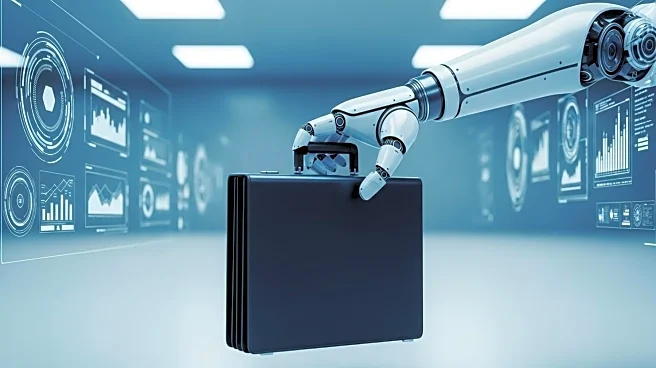What's Happening?
John Chambers, former CEO of Cisco, has expressed concerns about the rapid advancement of artificial intelligence (AI) and its potential impact on the job market. Drawing parallels to the dot-com crash, Chambers warns that AI is moving at a pace five times faster than the internet did, which could lead to job destruction faster than new jobs can be created. He emphasizes the need for companies to adapt quickly to this new innovation economy or risk disappearing. Chambers also highlights the importance of changing education systems to prepare for the disappearance of entry-level jobs, both white- and blue-collar, due to increased productivity driven by AI.
Why It's Important?
The implications of Chambers' warnings are significant for the U.S. economy and workforce. If AI advances as rapidly as predicted, many workers could face unemployment, particularly in entry-level positions. This could lead to economic instability and require a major shift in educational and training programs to equip workers with new skills. Companies that fail to adapt to the fast-paced changes brought by AI may struggle to maintain competitiveness, potentially leading to a reshaping of industries and corporate landscapes. The focus on AI-driven productivity also raises questions about the balance between technological advancement and job creation.
What's Next?
Chambers suggests that companies should invest in new areas to create jobs rather than solely focusing on increasing dividends. The need for re-education and skill development is crucial to mitigate the impact of job losses. As AI continues to evolve, businesses and policymakers will need to address the challenges of workforce displacement and ensure that the benefits of AI are distributed equitably. The future may involve a period of adjustment where workers are retrained and industries are restructured to accommodate the new technological landscape.
Beyond the Headlines
The ethical and cultural dimensions of AI's impact on employment are profound. The potential for widespread job losses raises questions about the social responsibility of companies and the role of government in supporting affected workers. The rapid pace of AI development also challenges traditional business models and may require a reevaluation of corporate strategies to prioritize sustainable growth and workforce development.








